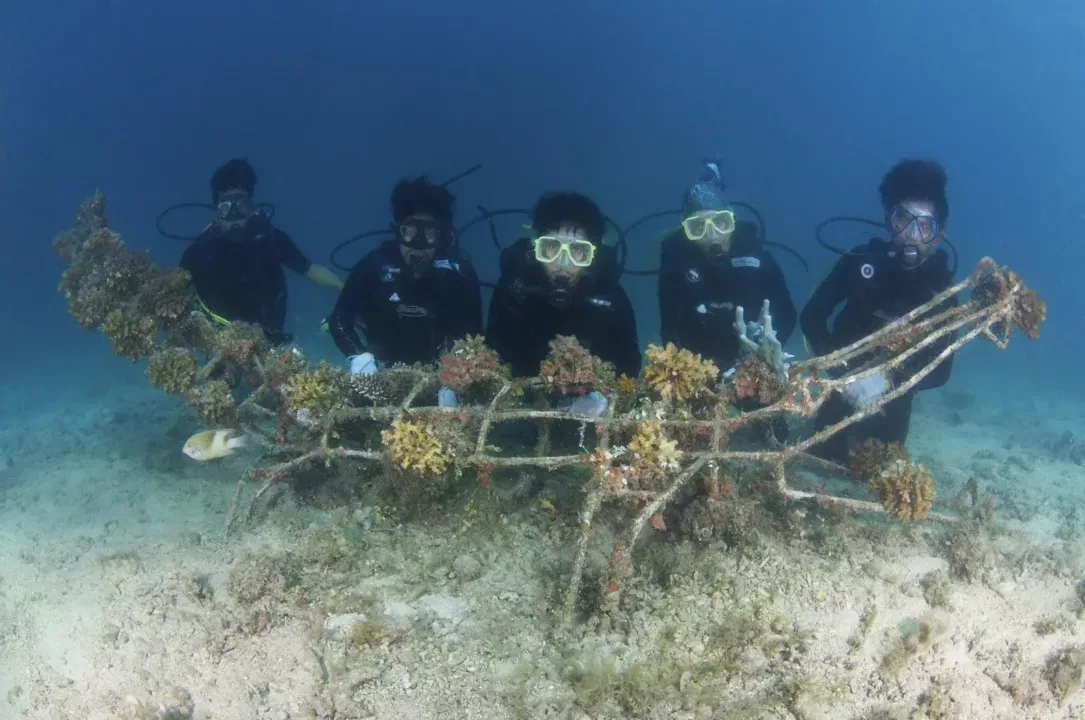Site restoration of coral reefs in the Sulu Sulawesi seascape in South East Asia will be supported by a European Union project which launched this year.
The Ocean Governance project (2020-23) aims to protect and restore marine ecosystems as catalysts for building peace and security and fostering sustainable economies in the Atlantic and South Asia. It builds on an earlier project to establish a transatlantic partnership between managers of marine protected areas in the Atlantic Basin. Of the project’s four components, one is devoted to the restoration of degraded marine and coastal ecosystems in South-East Asia, with a focus on coral reefs and mangroves.
The Sulu Sulawesi seascape is one of the world’s most richly diverse marine environments, supporting more than 500 species of reef-building corals and 2 500 species of marine fish; five species of sea turtles (green, hawksbill, olive ridley, loggerhead and leatherback) and at least 22 species of marine mammals, including sperm whales and dugongs. The mangroves, seagrass beds and coral reefs that form its habitats and coastal ecosystems are rich and productive, as are its soft-bottom and pelagic environments.
Like many marine ecosystems, however, this seascape faces considerable threats. Increasing demand from a growing local population and internationally have depleted its ecological resources beyond the capacity for natural recovery. Changes in land-use, urbanisation and mining have depleted and destroyed coastal ecosystems; run-off, siltation and dredging have affected seagrass beds and coral reefs; and destructive fishing methods and gear have damaged reefs, stripped the sea-bed and depleted marine populations.
In 2001, Indonesia, Malaysia and the Philippines prepared a biodiversity conservation vision for the Sulu Sulawesi Marine Ecoregion, which the three countries share. They signed a Memorandum of Understanding in 2004 committing to conserve the ecoregion.
Coinciding with the start of the UN Decade on Ecosystem Restoration, from 2021-2030, the Ocean Governance project aims to enable biodiversity conservation by involving national authorities/stakeholders and local communities in the restoration of degraded marine and/or coastal ecosystems. It will bring together partners from different countries or regions, test novel best practices and document this scientifically while engaging with stakeholders and local communities to communicate on the importance of effectively managed marine and coastal ecosystems for local economies.
Prevented by the COVID-19 pandemic and related travel bans from undertaking site visits and local meetings in 2020, the project team, including implementing partner for the restoration component GOPA Consultants/WWF Indonesia, have assessed 17 potential sites in 4 areas (Derawan, Indonesia; Tun Mustapha, Malaysia; Semporna, Malaysia; and Balabac, the Philippines) to develop a shortlist of six sites, from which 3 will be selected. They assessed the potential sites against biophysical, social, economic and threat parameters, and used a scoring system to identify the most eligible. They held virtual consultations with MPA authorities and governments, and focus group discussions with marine experts and programme managers from WWF Malaysia, Indonesia and the Philippines. The scoring is based on most recent available data, local expert opinion, government and MPA authority recommendations.
“The purpose of restoration is to build resilience into existing habitats by reducing local threats and allowing the habitats to recover and, where needed, stimulate artificial recovery to bring back or accelerate habitat and associated species,” said Puri Canals, the project’s team leader. “Of course, it goes without saying that restoration can only commence once current threats to the ecosystem have been addressed and reduced.”
The restoration methods used will be selected according to specific characteristics of each site, taking into account the available budget, local conditions, stakeholder involvement, socio-economic benefits, and the ecological success rate. One option being explored is the opportunity to combine coral reef restoration with placing of mooring buoys, especially if the sites are frequently visited by dive tourists. ‘Eco-mooring’, designed specifically to enhance flora and fauna, has been developed in other regions in the world and the project will explore the feasibility of adopting this type of restoration.
Once the sites are selected, the next steps are to develop management plan and restoration action plans for each and agree these with national and local authorities and institutions, local partners and civil society. A monitoring and evaluation system will be set up for each site with workshops to follow up on activities, document progress (percentage of live coral cover, rates of coral recruitment, fish diversity and abundance) and mitigate any issues.
“A three-year restoration project may not have a significant impact on the ecosystem, but we hope that this project will give MPA managers and local stakeholders the opportunity to learn together and improve their capacity to manage and monitor the restoration,” said Veda Santiadji of WWF Indonesia. “Building on this advantage, we would expect the restoration activity to be followed up by local stakeholders and to provide long-term benefits to the ecosystem and to those who live and work close to the sites.”
For more information please contact:
- Puri Canals, Technical Coordinator, EU Ocean Governance Project
- Veda Santiaji, South East Asia, Restoration Sites Coordinator, EU Ocean Governance Project

